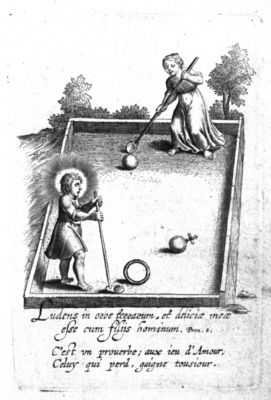Lusus Amoris [48]

VI.
Hugo.1
TOtus orbis terræ est quasi quidam ludus glo-
bi aut pilæ; quæmodo ab illo tenetur, modo
ad illum proijcitur, & aliquando diuiditur in par-
tes, & ille vnam partem habet & alius aliam. Sic
fit de orbe; primò fuit monarchia apud Assyrios,
& postea quasi pila aut globus proiectus venit ad
Persas & Medos, postea ad Græcos, postea ad Ro-
manos, modò diuisa est pila; quis est qui proiecit
& reiecit toties illam pilam aut globum? nonne
Amor? sed amor inordinatus, qui proijcit vt diui-
dat, reijcit vt destruat. Amor hic diuinus proijcit
& globum, globum monarchiæ Ecclesiasticæ;
proijcit, sed semper ad vnum & idem: vnum (in-
quam) & idem gremium Ecclesiæ, vnum & idem
caput, quod est summus Pontifex. proijcit vt cu-
stodiat, proijcit vt defendat.
TOtus orbis terræ est quasi quidam ludus glo-
bi aut pilæ; quæmodo ab illo tenetur, modo
ad illum proijcitur, & aliquando diuiditur in par-
tes, & ille vnam partem habet & alius aliam. Sic
fit de orbe; primò fuit monarchia apud Assyrios,
& postea quasi pila aut globus proiectus venit ad
Persas & Medos, postea ad Græcos, postea ad Ro-
manos, modò diuisa est pila; quis est qui proiecit
& reiecit toties illam pilam aut globum? nonne
Amor? sed amor inordinatus, qui proijcit vt diui-
dat, reijcit vt destruat. Amor hic diuinus proijcit
& globum, globum monarchiæ Ecclesiasticæ;
proijcit, sed semper ad vnum & idem: vnum (in-
quam) & idem gremium Ecclesiæ, vnum & idem
caput, quod est summus Pontifex. proijcit vt cu-
stodiat, proijcit vt defendat.

Ieu de l'Amour.
VI.
Dis moy, amour, que fais tu dans le monde?
Ie fais rouler ceste machine ronde,
Ie fais iouer tous les ressorts du ciel:
C'est moy, qui fais naistre des feux & flames,
C'est moy, qui fais perdre & gaigner les ames,
Et qui leur donne vn ieu perpetuel.
VI.
Dis moy, amour, que fais tu dans le monde?
Ie fais rouler ceste machine ronde,
Ie fais iouer tous les ressorts du ciel:
C'est moy, qui fais naistre des feux & flames,
C'est moy, qui fais perdre & gaigner les ames,
Et qui leur donne vn ieu perpetuel.
Translations
 |
Play of love. |
 |
The whole wide world is like a kind of ball game.3 At one time it is held by one, at another it is shot to him, and at some other moment it is divided into parts, and he holds
one part, and someone else another. So it happens with the world too. First sole rule was with the Assyrians and afterwards,
shot away like a ball it came to the Persians and the Medes, later to the Greeks, later again to the Romans, sometimes the
ball is shared. Who is it who shoots that ball to and fro so many times? Is it not love? But it is a love without order, that
shoots in order to divide, shoots back in order to destroy. This love here also shoots a ball, the ball of the sole rule of
the Church: it also shoots a ball, but always to one and the same, to one and the same bosom, I maintain, of the Church, i.e.,
the Pope. It shoots to guard, it shoots to defend. |
 |
Playing in the world; and my delights are with the sons of men.4 |
Literature
Sources and parallels
-
Possibly based on, field borders and background landscape added, in: Lusus amoris. [32] (in: anonymous, Amoris divini et humani antipathia (1628))
[Compare
![Compare [compare]](/static/images/compare2.gif) ]
]
-
Same copperplate, slightly altered, in: Liefde is de beste leermeester [22] (in: Willem den Elger, Zinne-beelden der liefde (1703))
[Compare
![Compare [compare]](/static/images/compare2.gif) ]
]
-
Remake of image, not mirrored, wings of Amor divinus removed, female figure as Anima taking place of Amor humanus,
in: Hâc vincitur, illâc perditur [26] (in: anonymous, Typus mundi (1627))
[Compare
![Compare [compare]](/static/images/compare2.gif) ]
]
References, across this site, to this page:
- Lusus amoris. [32] (in: anonymous, Amoris divini et humani antipathia (1628))
- Liefde is de beste leermeester [22] (in: Willem den Elger, Zinne-beelden der liefde (1703))
- Pila mundus Amorum est. [1] (in: Daniël Heinsius, Ambacht van Cupido (1613))
- Pila mundus Amorum est. [1] (in: Daniël Heinsius, Ambacht van Cupido, from: Nederduytsche poemata (1616))
- Hâc vincitur, illâc perditur [26] (in: anonymous, Typus mundi (1627))
Iconclass
Comments
commentaryNotes
'Hugo.' will have to be traced: Hugo of St. Cher?
Prov. 8:31.
'ball game', as shown on the emblem. 'Pila' and 'globus' may both mean 'ball', and have been translated here only once.
'Rejoicing in the habitable part of his earth; and my delights were with the sons of men' (KJV). 'Rejoicing in his inhabited
world and delighting in the sons of men' (RSV).
![[H O M E : Emblem Project Utrecht]](/static/images/rd-small.gif)




































































































